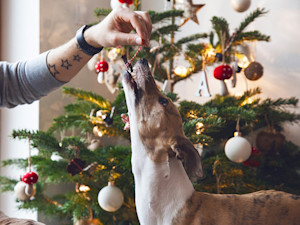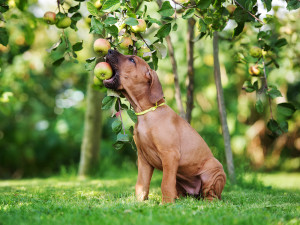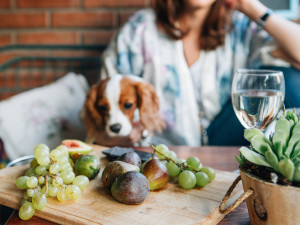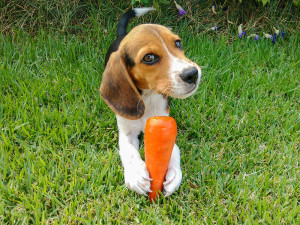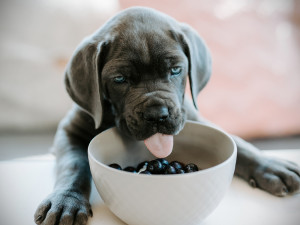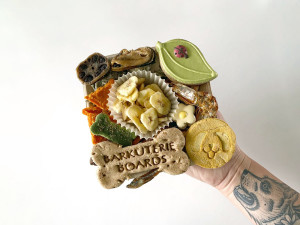Can Dogs Eat Turkey?
Before you invite them to the Thanksgiving table, here’s what you should know.
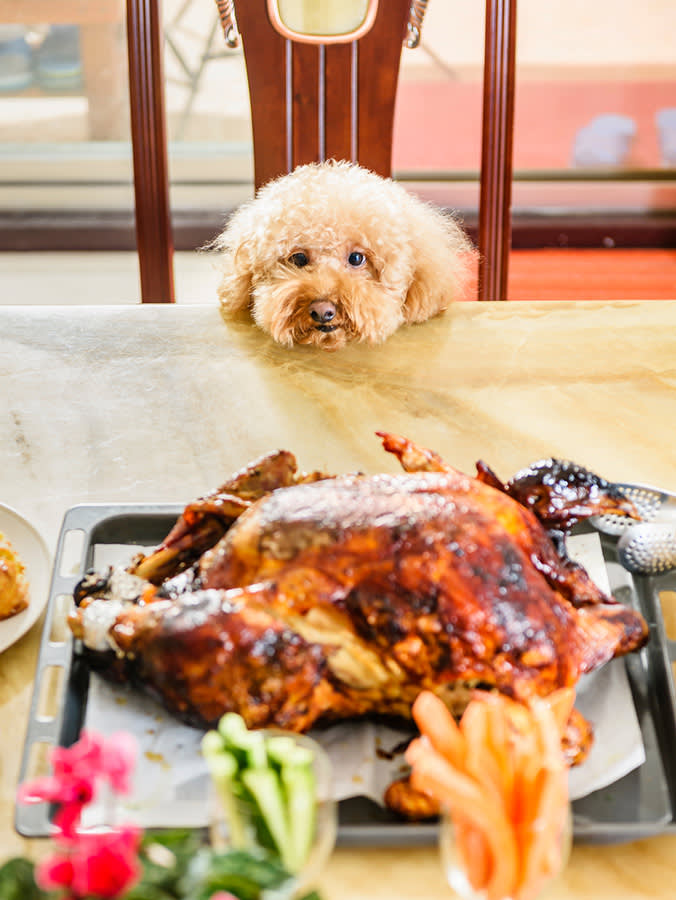
Share Article
It’s time for Thanksgiving, which to most people means one thing: It’s time for turkey. If you’re a dog parent, you’ll probably be faced with some seriously cute puppy-dog eyes when you grab a turkey leg for your own plate. So, you might be wondering: Is turkey safe to feed to dogs?
Plain turkey is generally safe, but the turkey you’re eating is probably loaded up with spices and toppings — which might make it a no-go. We talked to veterinarian Dr. Amy Fox about when it’s safe to feed our pups a bite of our Thanksgiving feast.
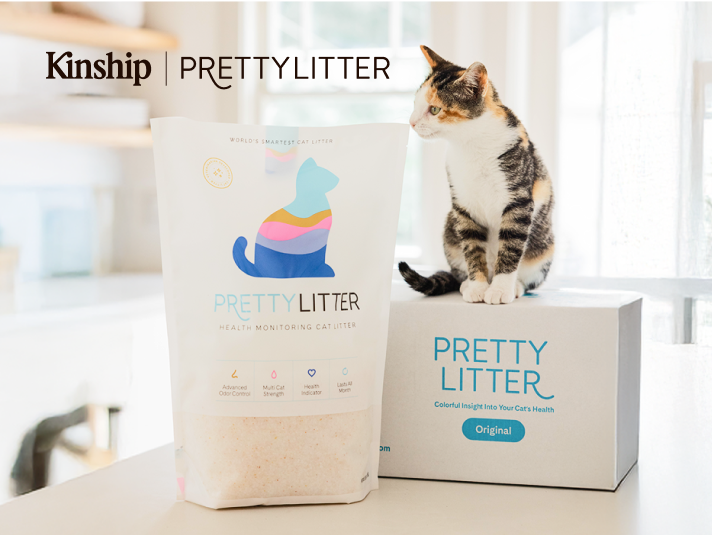
Save on the litter with color-changing tech that helps you better care for your cat.
Nutrition facts of turkey for dogs
Is turkey good for dogs?
Turkey is rich in nutrients, such as riboflavin and phosphorus. Because of its high protein content, turkey is actually a common kibble ingredient — but the turkey found in dry dog food isn’t the same as the turkey on our Thanksgiving table. More likely than not, your Thanksgiving turkey includes salt, seasoning, and fats that most dogs should avoid. That being said, your dog still might be able to partake in turkey day — under the right circumstances.
“Plain, white-meat turkey can be OK in small bite-sized amounts,” Dr. Fox tells Kinship. “But pet parents should avoid sharing anything fatty, such as the skin or dark meat, and anything with sauce or seasoning on it.”
Can dogs have turkey bones?
The answer to this is a hard no. Save the wishbone for your human guests; dogs should never, under any circumstances, have turkey bones.
“Smaller, hollow bones, like turkey bones, can splinter and break, especially once cooked, causing injuries as dogs try to chew and swallow them,” Dr. Fox adds. “They can also cause intestinal blockages and bone impactions further down in the digestive tract.”
Can dogs have white-meat turkey?
Dogs can have a few small bite-sized pieces of plain white-meat turkey without any sauces or seasoning.
Can dogs have dark-meat turkey?
While not toxic to dogs, it’s best to avoid dark-meat turkey, given its high fat content. This high-fat content can put your dogs at risk for digestive upset or pancreatitis.
Is turkey completely safe for dogs?
Both white and dark-meat turkey is non-toxic to dogs. However, pet parents should proceed with caution when treating dogs to some turkey. If you do choose to give your dogs a few bites of white-meat turkey, ensure they are small and are served without seasoning or sauces.
And, as with giving your dog any people food, moderation is key. “Some of the common emergencies pets encounter around the holidays include digestive upset from over-indulging in foods they are not accustomed to,” Dr. Fox says. “In more serious cases, this can also cause pancreatitis, often from eating fatty or spicy foods.”
Other commonly served Thanksgiving foods that are safe for dogs
Carrots
Plain carrots are a healthy and nutritious snack for dogs. However, because most carrots are served salted and seasoned, maybe slip your dog a plain one during Thanksgiving prep. For more info on safely sharing carrots with your dog, check out our guide on whether you can feed dogs carrots here.
Cooked sweet potato
Sweet potato is considered a “superfood” for both humans and dogs thanks to its digestive properties. But dogs should definitely enjoy this superfood as plainly as possible and in moderation. Similar to the carrots, if you plan to season your sweet potatoes this Thanksgiving, consider setting a plain one off to the side for your dog when cooking. For more info on safely sharing this snack with your pup, read this about feeding your dog sweet potatoes.
Apple
Apples are a sweet treat your dog can enjoy safely, once the seeds and the core are removed. Not to sound like a broken record, but moderation is also key when it comes to apples and your dog. Similarly, avoid sharing apple pie with your dog. While cooked apples aren’t toxic to pups, the sugar and fat in apple pie is likely to upset their stomach. For more info on safely sharing apples with your dog, check out our guide.
Other commonly served Thanksgiving foods that are not safe for dogs
Garlic and onions
Although not usually served by themselves, garlic and onions are usually involved somewhere in the process of making Thanksgiving food delicious. But, bad news: Garlic and onions are toxic to your dog. Avoid giving your dog any foods cooked or seasoned with these items. Read this for or more info on the toxicity of garlic and onions for dogs.
Grapes and raisins
Sometimes used in stuffing, raisins pose a very big risk to dogs. Even small traces of grapes or raisins can cause kidney failure in dogs. Besides stuffing, avoid serving raisins and grapes in dishes that dogs can easily reach. Do not offer dogs foods that were cooked with raisins or grapes, even if the raisins and grapes have been removed. Here’s more on why raisins and grapes are so toxic to pups.
Pecans and walnuts
Common pie fillings, such as walnuts and pecans, are both very toxic to dogs. Both nuts contain juglone, which can cause vomiting and GI distress. Unlike raisins and grapes, one or two dropped nuts are not likely to harm your dog, though you should monitor your pup after any amount of consumption. If your dog gets into a bag of nuts or a pie, however, make sure to get them veterinary attention as soon as possible.
High fat content foods
Thanksgiving is a time when humans indulge in some delicious and rich dishes, but that doesn’t mean your dog should. Fatty foods, such as buttery veggies or dark-meat turkey, can cause GI upset or even pancreatitis in your pup. Always make sure even “non-toxic” human foods are served plain without butter, seasoning, or tons of salt.
Bottom line: Can dogs eat human food?
Most of the time, human food is best reserved for, well, humans — especially foods prepared with spices and sauces, such as those commonly found on the Thanksgiving table. But some human foods, like plain, white-meat turkey, are perfectly safe for your dog in moderation. That being said, if your dog has stomach sensitivities or dietary restrictions, it is better to be safe than sorry and avoid human food altogether.
In the grand scheme of things, human food should never make up more than 10 percent of your dog’s diet and is best reserved for a special occasion. Even on special occasions, such as Thanksgiving, it’s best to start off with a small amount and monitor your dog’s reaction to any new or special food.

Rebecca Caplan
Rebecca Caplan is a writer based in Brooklyn whose work has been featured in The New Yorker, Reductress, and Vulture. She lives in Brooklyn with her perfect, toothless dog Moose.
Related articles
![Various Veggie Chips in a Ceramic Blue Bowl]()
Can Dogs Eat Sweet Potatoes?
Add it to the list of healthy human superfoods pups can eat, too.
![thanksgiving person hugging cat and dog]()
10 Usual Suspects at Thanksgiving and How to Save Your Pet From Them
Because you really need to stop Aunt Beth from trying to give your cat wine.
![Beagle puppy dog holding a peeled carrot in its front paws sitting in the grass]()
Can Dogs Eat Carrots?
Yep—this crunchy, sweet vegetable is a great addition to your dog’s diet.
![Puppy eating a bowl of blueberries]()
10 Superfoods You Should Share With Your New Dog
From kale to quinoa, these nutrient-packed picks deserve a spot in your dog’s food bowl.
![A person's hand holding up a Barkuterie Charcuterie Board with banana chips and other dog treats]()
Barkuterie Boards Are the Perfect Gotcha Day Treat
Spoil your pup with an artfully arranged charcuterie board of jerky strips, baked biscuits, and pet-safe crudités. What more could a four-legged foodie want?
